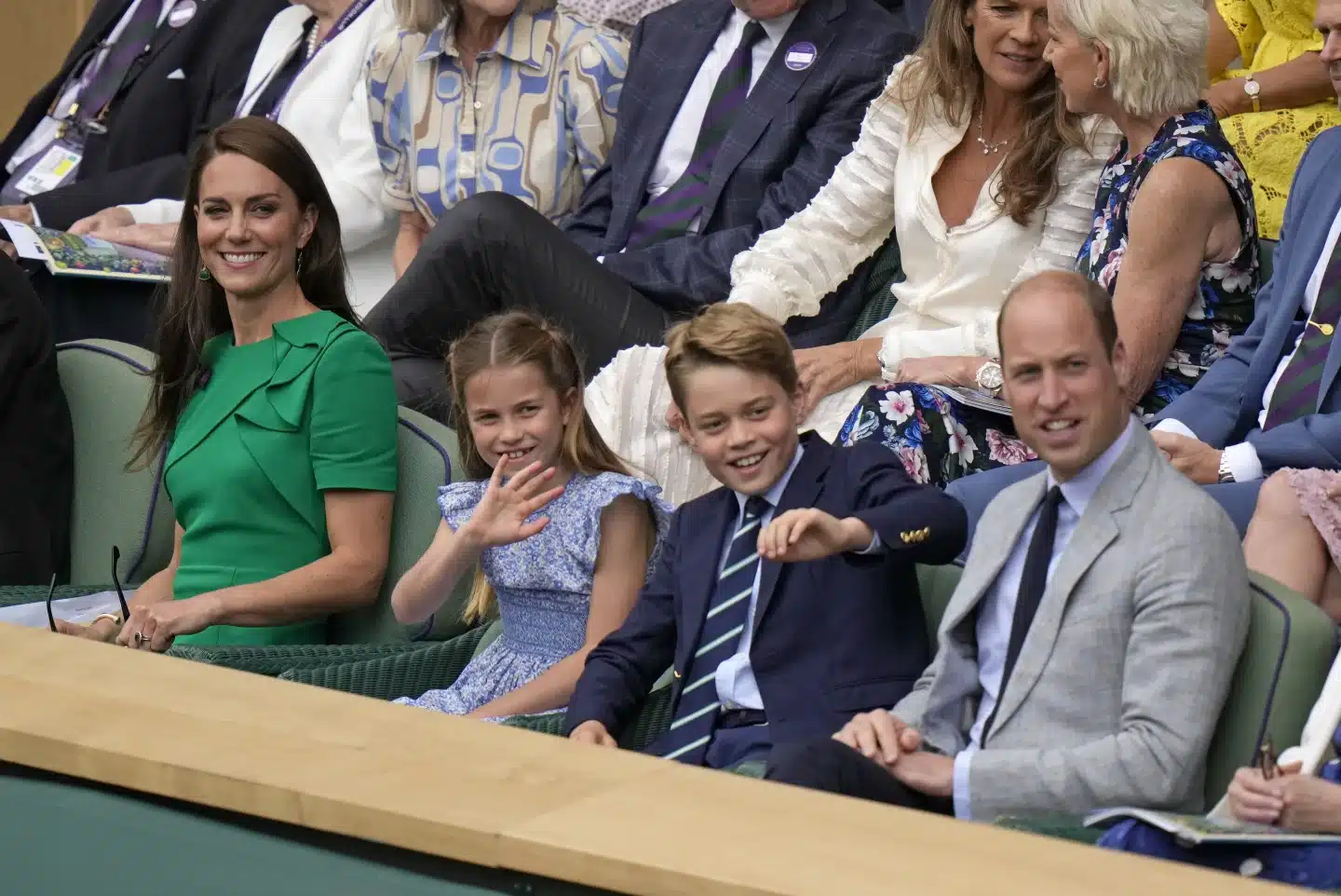U.K News
2023: Princess Kate Back In Royal Box At Wimbledon With Prince William

England’s WIMBLEDON — On Sunday, Kate, the Princess of Wales, returned to Wimbledon, this time bringing her family along.
The princess was present with her husband, Prince William, and their two eldest children, Prince George and Princess Charlotte. She wore green attire to match the color of the All England Club’s grass color.
The British throne’s heir, Prince William, wore a grey blazer.
Kate, the Princess of Wales, returned to Wimbledon, this time bringing her family along.
Kate was scheduled to give the winning Carlos Alcaraz the trophy during the men’s final, which featured seven-time champion Novak Djokovic.
Alcaraz is the third Spanish player to compete in the Wimbledon men’s final, and King Felipe VI of Spain was present in the Royal Box to see the event.
They included Billie Jean King, Chris Evert, Stan Smith, Stefan Edberg, and Jan Kodes, among other former Wimbledon champions.
There was also expected to be a visit from the ambassadors of Serbia and Spain.
As the All England Club’s patron, Kate has visited the Royal Box several times this year, sitting close to eight-time champion Roger Federer on one occasion and Billie Jean King on Saturday during the women’s final.
SOURCE – (AP)
U.K News
June UK Inflation Remains at the 2% Target, with a Potential rate cut on the “Knife Edge.”

(VOR News) – Inflation in the United Kingdom stayed constant at the target rate of 2% that was established by the Bank of England in the year leading up to June, as indicated by official figures that were issued on Wednesday.
It is possible that this result will be sufficient for policymakers to accomplish their goal of lowering the cost of borrowing money the following month.
The Office of National Statistics reports that the hospitality business, which includes establishments such as hotels and restaurants, was responsible for the most substantial upward contribution to the annualized inflation rate.
A number of analysts are of the opinion that the increased pricing can be attributable to the fact that Taylor Swift is now on tour in the United Kingdom.
The clothing and footwear business, which had extensive sales throughout the month, was the sector that made the most substantial contribution to the fall in sales.
When the flat number was compared to June of the previous year, it was slightly higher than what was projected to be the case. In the majority of instances, analysts had anticipated a modest fall to 1.9% of the total economy.
July 2021 was the last time inflation reached 2%.
Before the price increase began. As a result of the Coronavirus pandemic, supply chain concerns initially occurred. The increase in energy costs was attributed to Russia’s invasion of Ukraine. The situation was exacerbated by both of these factors.
The financial markets are anticipating that the decision about whether or not the Bank of England will decrease its main interest rate from 5.25% on August 1 will be something of a close call. Both of these decisions are expected to be made on August 1.
There are a number of policymakers who continue to voice concern regarding the extent of price rises in the vital services sector as well as the rate of wage increases. Both of these factors significantly increase the likelihood of a return in inflation in the event that interest rates are decreased too recently.
The deputy chief economist of abrdn, which was formerly known as Aberdeen Asset Management, stated that “Today’s inflation report will keep the Bank of England’s August rate decision on a knife edge because of the uncertainty surrounding it.”
Abrdn employee Luke Bartholomew made this inflation statement.
“More fundamentally, the persistent stickiness of service inflation will leave the Bank wondering how long inflation will remain at the 2% target,” according to the official statement.
In order to battle the quick development in inflation, which reached a peak of more than 11% in late 2022, the Bank of England, along with the Federal Reserve of the United States and other central banks, swiftly increased interest rates in late 2021 from near zero. This was done in order to counteract the rapid growth in inflation.
The British economy, on the other hand, has been slowed down by increased interest rates, which have contributed to the reduction of inflation by making it more expensive to borrow money.
There has been very little improvement in the economy of the United Kingdom since the recovery from the epidemic.
The Prime Minister of the United Kingdom, Keir Starmer, has underlined that the key purpose of his Labour government would be to increase the pace of economic growth in the United Kingdom.
This is the primary objective that he desires to achieve. An statement addressing the goals that his government has for the coming year is going to be made later on Wednesday and will be made public.
According to Starmer, the measures that were disclosed in the King’s Speech to Parliament will “create wealth for people up and down the country” and “take the brakes off Britain” by stimulating economic growth. This is what Starmer believes will happen.
SOURCE: USN
SEE ALSO:
Bangladesh closes Universities and Colleges indefinitely Following Deadly Protests.
Will The Seine Be Clean Enough By The Olympics? Not Even The Experts Know Yet
Biden Set to Announce Support for Major Supreme Court changes
U.K News
Exit Polls in UK Show Labour Party Headed for Landslide Victory

An exit poll indicated that, following 14 years of political and economic turmoil, voters would punish the governing Conservatives by handily electing the UK’s Labour Party to a landslide victory in Friday’s parliamentary election.
Moments after the polls closed, the results of the survey showed that Keir Starmer, the head of the center-left Labour party, will become the next prime minister of the nation. He will confront a jaded public that is eager for change in the face of a depressing economy, growing institutional mistrust, and a deteriorating social cohesion.
The Conservatives were in shock by their historic setback, which would leave the party in disarray and probably lead to a leadership contest against Prime Minister Rishi Sunak. Thousands of election workers were tallying millions of ballot papers at counting stations across the nation.
In the last hours before voting closed, London voter James Erskine expressed optimism for change, saying, “Nothing has gone well in the last 14 years.” “I just think there could be a huge change here, and that’s what I’m hoping for.”
Reform UK leader Nigel Farage stokes controversy
Though many of the same populist undercurrents flow in Britain, the proposed result seems to defy recent rightward electoral changes in Europe, especially in France and Italy.
With his party’s anti-immigrant “take our country back” stance, Reform UK leader Nigel Farage has stoked controversy and undermined support for the Conservatives, who already faced bleak chances.
The exit poll indicates that Labour will take around 410 seats in the 650-seat House of Commons, while the Conservatives will hold 131 seats. The Tories would have the fewest seats in their almost 200-year history, which would leave the party in chaos.
Some smaller parties, such as the moderate Liberal Democrats and Reform UK, seemed to have done well, which may be an indication of the unstable public mood and dissatisfaction with the system. One significant unanswered question was whether Farage’s hard-right party would be able to leverage its popularity to win more than a few seats in Parliament.
Labour Party politicians wary
The survey revealed “a catastrophic result in historic terms for the Conservative Party,” according to former Conservative leader William Hague. Nevertheless, Labour Party politicians were wary due to years of disillusionment.
Deputy leader Angela Rayner told AP News, “The exit poll is encouraging, but obviously we don’t have any of the results yet.”
Ipsos, a pollster, asks participants at a number of polling places to complete a duplicate ballot that represents their voting behavior. Typically, it offers a trustworthy but imprecise forecast of the result.
British voters cast paper votes, writing their selections in pencil, which are subsequently tallied by hand. We anticipate having final results by Friday morning.
A series of stormy years in Britain, some of which the Conservatives created and some of which they did not, have left many voters with doubts about the future of their nation.
The COVID-19 epidemic, Russia’s invasion of Ukraine, and the United Kingdom’s withdrawal from the European Union all hurt the economy, yet lockdown parties hosted by then-prime minister Boris Johnson and his staff infuriated the public.
Source: AP
U.K News
Former Top Northern Irish Politician Jeffrey Donaldson To Stand Trial Over Alleged Sex Offenses

Jeffrey Donaldson, the former head of Northern Ireland’s most famous pro-union party, will face trial on charges of previous sex offenses, including one of rape.
Donaldson went before a preliminary inquiry on Wednesday, which agreed to proceed with a trial set for September 10, according to a statement issued to CNN by the Northern Ireland Courts and Tribunals Service (NICTS).

Donaldson | CNN image
Former Top Northern Irish Politician Jeffrey Donaldson To Stand Trial Over Alleged Sex Offenses
The lawmaker has since been charged with an additional seven counts. The 18 alleged acts include one allegation of rape, 13 charges of indecent assault on a female youngster, and four counts of gross indecency toward a kid.
Donaldson was asked in court whether he wanted to speak about the charges, according to PA Media. “Not at this stage,” he said, according to the news agency.
Eleanor Donaldson, his wife, is also scheduled to stand trial in September. She has been charged with one count of helping and abetting rape, three counts of aiding and abetting assault on a female child, and one count of cruelty to a person under 16.
Donaldson led the DUP from 2019 through much of the contentious Brexit process, frequently expressing his opposition to the Northern Ireland Protocol, a vital component of the Brexit withdrawal agreement that ensured there would be no hard border between Northern Ireland and the Republic of Ireland.
Donaldson and his wife have already denied all claims, according to Irish national network RTÉ on Wednesday.

Jeffery Donaldson | CNN Image
Former Top Northern Irish Politician Jeffrey Donaldson To Stand Trial Over Alleged Sex Offenses
Donaldson’s trial was announced as Northern Ireland residents prepared to vote in the UK general election. Northern Ireland, one of the UK’s four devolved nations, has 18 members in the Westminster parliament. Northern Irish politicians can run for a seat in Westminster or the devolved legislature, the Northern Ireland Assembly. Sinn Féin, the leading nationalist party, does not take up their seats in Westminster if elected.
Donaldson was set to run again in the Lagan Valley constituency, but former DUP party colleague Jonathan Buckley has replaced him.
SOURCE – (CNN)
-
World2 weeks ago
Former President Trump Survives Being Shot at Pennsylvania Rally
-
Tech4 weeks ago
Huawei Launches 5G-A Pioneers Program at MWC Shanghai 2024: Paving the Way for a Connected Future
-
Sports4 weeks ago
NBA Draft: Kyle Filipowski Withdraws Unexpectedly From The First Round
-
Tech4 weeks ago
ChatGPT Answers Undiscovered Questions and Outperforms Students.
-
News4 weeks ago
US Supreme Court Rejects Drug Deal that Protects the Sackler Family
-
Health4 weeks ago
US Health Agency Issues Dengue Virus Infection Warning


















